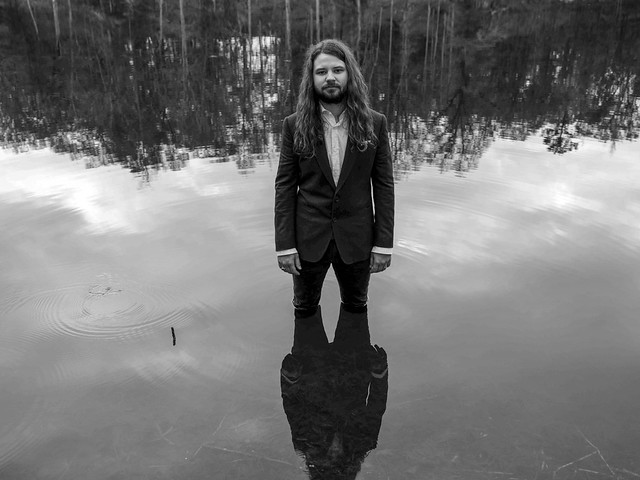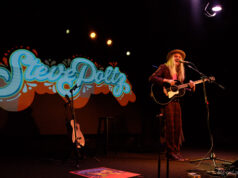
Brent Cobb (Photo by Don Van Cleave)
Grammy Award nominee Brent Cobb understands how to put a show together. Southern rap played him onto the stage at the Rock & Rock Hotel recently, ending with a flourish of horns. Strumming a few notes on his acoustic guitar, Brent conversationally told the audience he was going to “ease you on in.” He started his set with the beautiful “Keep ’Em on Their Toes,” about “the best thing you can do when the ignorance shows.” He stopped to acknowledge an especially gorgeous riff by his bushy-bearded lead guitarist, remarking, “Isn’t that pretty?”
By the end of his set, the style and intensity of music had completely changed. Brett comes from small-town Georgia, and his father and uncle played in a country band. (And he played their song, “Country Bound.”) But he’s also discussed that his mother, whose family is from Cleveland, shared her love of muscular rock like Neil Young with him. His acoustic traded for an electric guitar, Brett faced his lead guitar player, and the two tore into their instruments, playing off each other, crushing the venue with pure rock.
Between the “nice and easy” opening number and the sublime violence of the finale, Brett presented great song after great song to a diverse audience. In a corner near the stage, the personalities included burly military veterans, a blues singer from Richmond, and a pregnant woman and her husband. Brent’s appeal crosses over from fans of country-rock to people who have more of an appreciation for singer-songwriters, and his show attracted an audience that range from their 20s to their 50s.
Brent followed “Keep ’Em on Their Toes” with “Mornin’s Gonna Come,” a meditation on the old country chestnut of the hangover the morning after. After playing “Sucker for a Good Time,” which lends its name to his current tour, Brent said the audience was more of listening crowd. He felt like “you can see my every mistake, see into my soul.” It’s easy to forget just scary it can be to be up on stage.
Stream Providence Canyon by Brent Cobb on Spotify:
“Diggin’ Holes” celebrated the hardest and dirtiest of jobs, while “Down in the Gulley” paid tribute to the rebel spirit of moonshiners. With “Down Home,” Brent invited you into his world, displaying his talent for vivid description, breathing life and color into as thick and rick a description of small-town, rural Southern life as written by any of that region’s great novelists and poets. Brent has a genuine literary flare matched by his joy at getting raucous and rowdy. Many in the crowd were there for the songs and really knew the lyrics; at times, the whole audience spontaneously began to sing along.
Brent introduced “Solving Problems” as a “song about nothing.” Partway through the song, he broke to tell a story, which he said was also about nothing, of him bumming a cigarette off a friend. Showing his songwriting muscle, he moved right into “Ain’t a Road Too Long,” a song about dedication to life as an artist and gratitude.
As much as Brent’s small-town upbringing was a clear influence on his songs, so is his appreciation for the natural world. When he sang “Providence Canyon,” you found yourself in the park, Brent having perfectly captured a single day. He wrote “Black Creek,” he said, “when I was 16.” It’s a surprising song for a 16-year-old to have written, with its refrain of “wash my sins away,” a use of natural imagery that shows sophistication for such a young man.
While Brent put out his first major-label album in 2016, he’s been writing songs for much longer. “Let the Rain Come Down,” he told the audience, he wrote 13 years ago. It appeared on his first record, a minor-label release called No Place Left To Leave, released in 2006. In the 10 years that passed before his major-label debut, Shine On Rainy Day, Brent wrote songs for Miranda Lambert, Kenny Chesney, Little Big Town, and Luke Bryan, to name a few a few.
Songs like “Black Crow” and “Traveling Poor Boy” have earned Brent a reputation as “blue collar country” musician. The former portrays the desperation the desperation that leads to the robbery of a corner store. No country musician would be worth his salt without songs about missing the one they love, and “If I Don’t See Ya” admirably fits the bill. Before he came to the devastating finale, he played a cheating song, too: “.30-06”.
In the Ken Burns Country Music documentary airing now on CBS, Kris Kristofferson compares the genre to a kind of soul music. In the case of Brent Cobb, the comparison is especially apt. He sets the poetry of everyday life to a combination of American music that includes country, folk, soul, and rock sounds, acknowledging tradition with both feet firmly planted in the present.






